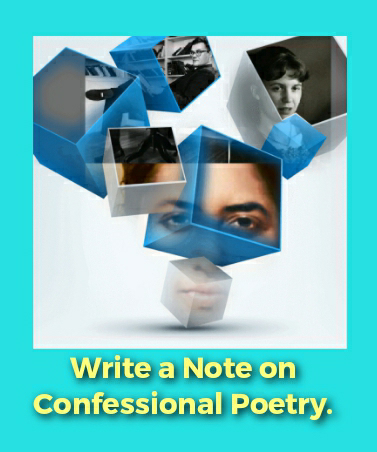What is Confessional Poetry?
Confessional Poetry means Personal Poem of the poet in where the narrator is First Person -"I", described extreme moments of individual experience, specially Taboo, such as- Suicide, Drug abuse, Sexuality, Alcoholism, Mental illness, Depression, Psyche, guilty.
Who coined This Term?
The founder of "School of Confessional Poetry", Robert Lowell used this "Confessional" term in his "Life Studies'' book. And this poetry emerged from the United States during the late 1950s and early 1960s.
Elements of Confessional Poetry:
Autobiographical concept
Lyrical Balance
Narration of First Person
Intimate subject matter.
Examples of The this Poetry:
Daddy
Lady Lazarus
Nick and The Candlestick
Summer in Calcutta
Skunk Hour and Waking in Blue
Famous poets:
Robert Lowell
Alycia Plath
John Berryman
Kamala Das
Anne Sexton
W.D. Snodgrass
Allen Ginsberg
Marie Howe
Sharon
Overview of the poems:
Daddy:
It is Sylvia Plath's best Confessional Poetry. This poem is about the complicated relationship between father and Daughter. Her father "Otto Plath" died when she was only Ten. It is a description of feeling and emotions to her father as says sing song of childhood rhyme:
"Daddy, I have had to kill you.
You died before I had time——
Marble-heavy, a bag full of God,
Ghastly statue with one gray toe
Big as a Frisco seal".
Also after the death of his father, she was very much depressed and try to attempt suicide, when says:
"At twenty I tried to die
And get back, back, back to you.
I thought even the bones would do."
Plath even exposes her intimacy with her husband with depressed and says:
"If I’ve killed one man, I’ve killed two——
The vampire who said he was you
And drank my blood for a year,
Seven years, if you want to know.
Daddy, you can lie back now."
Skunk Hour:
The poem also the example of confessional Poetry written by Robert Lowell in his Life Studies, an Anthology book. "Skunk Hour" means Disgusting Period. The poet exposed how the disgusting time spent in his life when he was lost the courage, desire and purpose of living life as well as frustration, doubts and failure and the poem ends with a core realisation how his life was becoming meaningless and painful and find out the right path of life from the last two Stanzas, If small animals spent their life with happiness at the extreme situation, I must do my best.
"only skunks, that search
in the moonlight for a bite to eat.
They march on their soles up Main Street:
white stripes, moonstruck eyes’ red fire
under the chalk-dry and spar spire
of the Trinitarian Church.
I stand on top
of our back steps and breathe the rich air—
a mother skunk with her column of kittens swills the garbage pail
She jabs her wedge-head in a cup
of sour cream, drops her ostrich tail,
and will not scare."
Summer in Calcutta:
Indian Poet Kamala Das's "Summer in Calcutta" as a Confessional Poetry in which she not only represents summer but also her physical thirst through symbols.
She breaks the path the Indian conventional poetry and make twist and turn as erotic, obscene and physical love from her dark unconscious level. In this poem, she plays with double meaning speaking in overtones and undertones:
What is this drink but
The April sun, squeezed
Like an orange in
My glass? I sip the
Fire, I drink and drink
Again, I am drunk
Yes, but on the gold
of suns, What noble
venom now flows through
my veins and fills my
mind with unhurried
laughter? My worries
doze. Wee bubbles ring
my glass, like a brides’
nervous smile, and meet
my lips. Dear, forgive
this moments lull in
wanting you, the blur
in memory. How
brief the term of my
devotion, how brief
your reign when i with
glass in hand, drink, drink,
and drink again this
Juice of April suns.
Why is Confessional Poetry important ?
The Confessional Poetry has healing power for self improvement. Wordsworth said,"Poetry is the spontaneous overflow of powerful feeling". Everyone has Personal emotions and feelings but once not exposed and slowly but steadily create depression and ultimately take a huge problem in once entire life. Confessional Poetry is the medium to relieve from the dark unconscious thoughts. It is the self awareness therapy and relief from catharsis moments through Poetry and creating one's perfect goal that waiting once in life.

Comments
Post a Comment